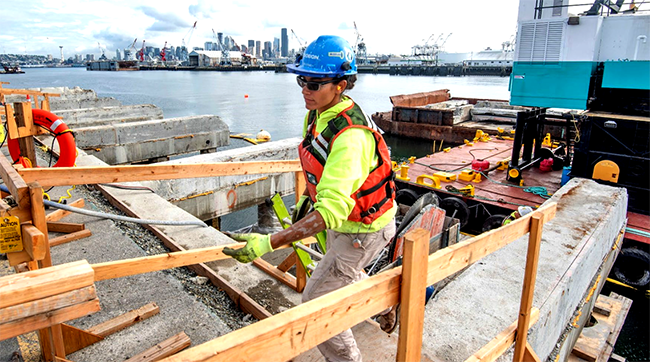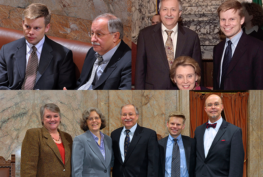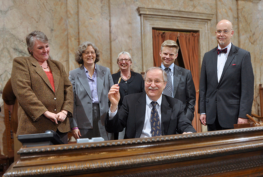Dear friends and neighbors,
Washington has consistently ranked as one of the best places in the nation to work. This year, the Legislature made meaningful progress in creating fairer and more equitable workplaces, increasing safety standards, and protecting consumers.
Creating safer and healthier workplaces
- HB 2266 promotes gender inclusivity and retention in the construction industry by helping construction workers who menstruate or express milk. Over 90% of workers in these well-compensated, highly skilled trades are men, and we will not change this until we tackle gender-based barriers to equal participation. Construction employers must provide reasonable accommodations to workers expressing milk, such as flexible work scheduling and access to handwashing stations and safe locations, other than a bathroom. The state Department of Labor & Industries must adopt rules to ensure construction workers have slightly longer bathroom breaks to get through their many layers of clothing and access to a supply of menstrual products. Washington is the first state in the nation to require access to menstrual products on construction sites.
- SB 5778, the Employee Free Choice Act, prohibits employers from disciplining or firing workers who refuse to attend meetings at which employers express opinions on religious or political topics. Washington is the sixth state to pass such a law. The legislation does not prevent employers from requiring attendance at training to reduce and prevent workplace harassment or discrimination. Employers’ speech is not restricted; it’s just that workers cannot be required to listen.
- SB 6105 improves the safety and well-being of workers in the adult entertainment industry by fostering a secure and professional environment in adult entertainment establishments. Strippers are workers, and they should be given the same rights and protections to which other workers are entitled, including protection from exploitation, trafficking, and abuse.
- HB 2022 improves safety for workers and the public when tower cranes are used. The law establishes a permit process for tower crane operations to ensure companies meet strict safety criteria and establishes criminal penalties for companies found in violation of safety regulations. It also requires local governments to permit street closures during the dangerous times when tower cranes are being assembled, disassembled, or reconfigured.
- SB 5793 broadens the definition of “family member” under Washington’s paid sick leave law and expands when an employee can use earned leave to include when their child’s school or daycare is closed.
- SB 5632 enables striking workers to maintain health care coverage. The loss of coverage is a heavy thumb on the scale against workers when they are choosing whether to exercise their legal rights, and this bill will help level the playing field.
Strengthening workers’ rights
- HB 1905 expands the Equal Pay and Opportunities Act to allow the Department of Labor & Industries to investigate pay equity discrimination claims on the basis of age, race, disability, and other classes protected under Washington’s anti-discrimination laws. Previously, the department had authority to investigate only claims based on gender.
- SB 6007 protects grocery store workers and communities from the potential negative effects of large corporate mergers (such as the proposed merger of Safeway and QFC). The bill sets basic guidelines for ownership changes, including public notice of new ownership, a period of job protection or re-hire for some current employees, protection of existing collective bargaining agreements, and mandatory engagement with local governments if a merger could cause the closure of a grocery store in an existing food desert.
- SB 5424 helps law enforcement agencies recruit and retain police officers by authorizing agencies to adopt flexible work policies that allow officers to work fewer than 40 hours per week.
- HB 2061 closes a loophole that subjects some health care workers to mandatory overtime.
- HB 2382 broadens the circumstances when survivors of drivers for transportation network companies such as Uber and Lyft can receive death benefits under the state workers’ compensation system.
Protecting consumers and supporting commerce
- HB 2156 adds consumer protections for people planning on installing solar panels at homes or businesses. It prohibits deceptive sales tactics, ensures that contracts are clear and contain all necessary provisions, requires that work be done by licensed electricians, and provides for enforcement under the state Consumer Protection Act.
- HB 2320 will help reduce usage of high-THC products by young Washingtonians by requiring cannabis retailers to post a standard notice about the possible health risks of high-THC cannabis, as well as developing optional training for retail cannabis staff.
- HB 1453 exempts anyone with a medical cannabis card from the 37% cannabis excise tax. This legislation makes a long overdue change to Washington’s law to provide qualifying patients and designated providers with terminal or debilitating medical conditions more affordable access to their medicine.
- SB 5376 will help reduce cannabis waste in a way that is better for the environment and for growers. The cannabis industry has a significant compostable waste stream, which currently must be mixed with fillers and sent to a landfill. Cannabis waste without usable THC can now be composted or used for fiber content, just like hemp. This means a significant reduction in the amount of cannabis waste going to landfills, as well as reduced costs.
- HB 1889 provides that applicants can receive professional licenses in Washington state regardless of their immigration or citizenship status, as long as they meet all other qualifications.
- In 2019, the Legislature passed landmark legislation to ban employer-imposed noncompetition agreements in Washington for workers who make less than $100,000 a year (now less than $120,000 after required inflation adjustments). This year, SB 5935 increases workers’ protections against noncompetes in response to real-life circumstances that have arisen since 2019. Consumers benefit too, as they will be able to follow their favorite car mechanic or other service provider who moves to a new location.
Thanks for taking the time to read my newsletter. If you missed my previous updates on gun safety, K-12 education, environmental protections, affordable housing, LGBTQ+ rights, public safety, transportation, health care, higher education, or community projects, they are available on my website. Please reach out with any questions at Jamie.Pedersen@leg.wa.gov.
Best wishes,
Jamie




